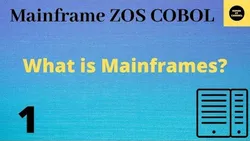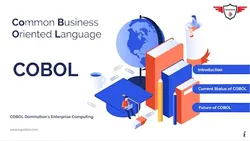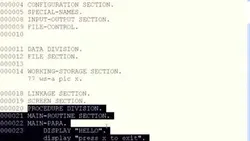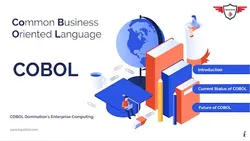
Mainframe COBOL 
This Mainframe COBOL course provides an introduction to the language and its use in batch and online processing. It covers the different statements in COBOL and how to use them. It also provides an overview of the mainframe environment and how to use it. The course is designed to help students gain the skills and knowledge needed to become proficient in COBOL programming. ▼
ADVERTISEMENT
Course Feature
![]() Cost:
Cost:
Free
![]() Provider:
Provider:
Youtube
![]() Certificate:
Certificate:
Paid Certification
![]() Language:
Language:
English
![]() Start Date:
Start Date:
On-Demand
Course Overview
❗The content presented here is sourced directly from Youtube platform. For comprehensive course details, including enrollment information, simply click on the 'Go to class' link on our website.
Updated in [May 25th, 2023]
This course provides an overview of Mainframe COBOL. It covers topics such as what is Mainframes, Mainframe COBOL Tutorial - Part 1, Batch and Online Process in COBOL, Mainframes COBOL Tutorial - Parts 2 and 3, and Different Statements in COBOL - Part 5 (Vol Revised). Participants will gain an understanding of the fundamentals of Mainframe COBOL and how to use it in their work. They will also learn about the different statements and processes used in COBOL and how to apply them in their own projects. By the end of the course, participants will have a comprehensive understanding of Mainframe COBOL and be able to use it effectively in their work.
[Applications]
The application of this course can be seen in the development of mainframe applications. It can be used to create batch and online processes, as well as to write different statements in COBOL. Additionally, the course can be used to revise existing COBOL programs. Furthermore, the course can be used to develop applications for mainframe systems, as well as to debug and troubleshoot existing applications. Finally, the course can be used to create and maintain databases on mainframe systems.
[Career Paths]
1. Mainframe COBOL Programmer: Mainframe COBOL Programmers are responsible for developing, testing, and maintaining software applications written in the COBOL language. They must have a strong understanding of the language and be able to write efficient code. With the increasing demand for mainframe applications, the demand for Mainframe COBOL Programmers is expected to grow.
2. Mainframe Database Administrator: Mainframe Database Administrators are responsible for managing and maintaining the databases that are used in mainframe applications. They must have a strong understanding of the database structure and be able to optimize the performance of the database. With the increasing demand for mainframe applications, the demand for Mainframe Database Administrators is expected to grow.
3. Mainframe System Analyst: Mainframe System Analysts are responsible for analyzing the requirements of mainframe applications and designing solutions to meet those requirements. They must have a strong understanding of the mainframe architecture and be able to develop efficient solutions. With the increasing demand for mainframe applications, the demand for Mainframe System Analysts is expected to grow.
4. Mainframe Security Analyst: Mainframe Security Analysts are responsible for ensuring the security of mainframe applications. They must have a strong understanding of the security protocols and be able to identify and mitigate potential security threats. With the increasing demand for mainframe applications, the demand for Mainframe Security Analysts is expected to grow.
[Education Paths]
1. Bachelor of Science in Computer Science: This degree program provides students with a comprehensive understanding of computer science principles and technologies. Students learn the fundamentals of programming languages, operating systems, computer networks, and software engineering. They also gain experience in developing and managing large-scale computer systems. This degree is ideal for those who want to pursue a career in software engineering, computer systems analysis, or computer programming.
2. Master of Science in Computer Science: This degree program provides students with an advanced understanding of computer science principles and technologies. Students learn advanced topics such as artificial intelligence, machine learning, and data science. They also gain experience in developing and managing large-scale computer systems. This degree is ideal for those who want to pursue a career in software engineering, computer systems analysis, or computer programming.
3. Master of Science in Information Technology: This degree program provides students with an advanced understanding of information technology principles and technologies. Students learn advanced topics such as database management, web development, and network security. They also gain experience in developing and managing large-scale information systems. This degree is ideal for those who want to pursue a career in software engineering, computer systems analysis, or computer programming.
4. Doctor of Philosophy in Computer Science: This degree program provides students with an in-depth understanding of computer science principles and technologies. Students learn advanced topics such as artificial intelligence, machine learning, and data science. They also gain experience in developing and managing large-scale computer systems. This degree is ideal for those who want to pursue a career in research, software engineering, computer systems analysis, or computer programming.
Course Provider

Provider Youtube's Stats at AZClass
Discussion and Reviews
0.0 (Based on 0 reviews)
Explore Similar Online Courses

Webpack Encore: A Party for your Assets

API Platform Part 2: Security

Python for Informatics: Exploring Information

Social Network Analysis

Introduction to Systematic Review and Meta-Analysis

The Analytics Edge

DCO042 - Python For Informatics

Causal Diagrams: Draw Your Assumptions Before Your Conclusions

Whole genome sequencing of bacterial genomes - tools and applications

Mainframe COBOL Tutorial

COBOL

COBOL Tutorial: COBOL - Common Business-Oriented Language
 Related Categories
Related Categories
 Popular Providers
Popular Providers
Quiz
 Submitted Sucessfully
Submitted Sucessfully
1. What is the main purpose of Mainframe COBOL?
2. What is the main focus of Mainframe COBOL Tutorial - Part 2?
3. What is the main focus of Mainframe COBOL Tutorial - Part 3?


Start your review of Mainframe COBOL